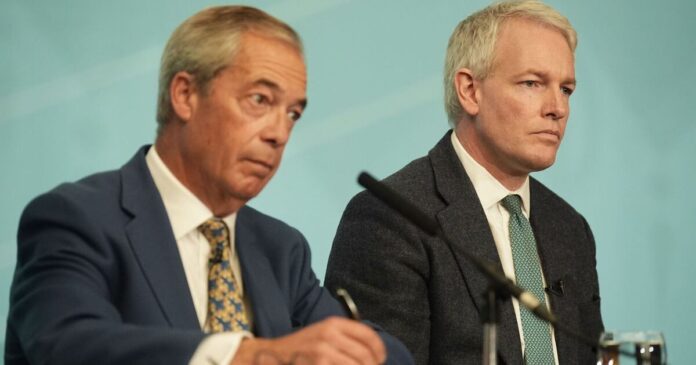Reform UK claims to be new, but peel back the label and you’ll find nothing more than the same broken Tory machine in a lighter shade of blue. Reform UK likes to market itself as a fresh force in British politics — a radical break from the failed establishment, a party that will stand up for ordinary people where the Conservatives have sold them out. But scratch beneath the surface and what do you see? Not a revolution. Not a new movement, and no new ideas. Just a rebranded Tory Party, complete with the same faces, the same baggage, and the same record of failure that dragged this country into decline in the first place.
Every week, it seems, another Conservative figure joins Reform, and Farage beams with pride as if he’s bagged a great prize. But who are these people? Nadine Dorries, who was the author of the disastrous Online Safety Act — legislation so authoritarian it was condemned by tech leaders and civil libertarians alike. Jake Berry, a Net Zero fanatic. Sarah Pochin, who spends her time championing refugee welcome events. Andrea Jenkyns, Danny Kruger, Maria Caulfield — all sat around Boris Johnson’s Cabinet table as the country slid into failure and decline. This is not renewal. This is recycling.
What we are witnessing is not the rats fleeing the sinking ship of the Tory Party for the lifeboat of Reform. No, it is worse. It is the Tory Party itself, repainted, rebranded, and relaunched under a new banner. The name changes. The blue gets lighter. But the substance — the very people responsible for Britain’s political and economic decline — remains the same.
These are not fringe names. Maria Caulfield. Lee Anderson. Nadine Dorries. Sir Jake Berry. Adam Holloway. Anne Marie Morris. Sir David Jones. Marco Longhi. Ross Thomson. Dame Andrea Jenkyns. Danny Kruger.
The list of defectors reads like a roll call of Conservative MPs who presided over 14 years of stagnation, betrayal, and failure. They openly swap rosettes as if that absolves them of their record.
Nigel Farage welcomes them with open arms, boasting about building a “movement.” But what kind of movement is it, exactly?
How can Reform claim to be the insurgent, anti-establishment party when its ranks are swelling with exactly the people who were the establishment?
Danny Kruger, for example, didn’t just warm the backbenches. He was in the heart of it — political secretary to Boris Johnson, campaign manager for Robert Jenrick, speechwriter to David Cameron.
This man has spent his career weaving the very fabric of the Westminster swamp, yet now he has the audacity to tell voters, “If you’ve had enough of politicians, join us.”
And then there’s the hypocrisy. Reform used to rail against Net Zero, yet embraces Jake Berry. It used to rail against mass immigration, yet welcomes Sarah Pochin. It used to rail against state censorship, yet brings in Nadine Dorries.
Each new defection chips away at Reform’s credibility leaving nothing but overt political expediency, turning it into nothing more than the Tory Party itself.
The truth is, Reform is not supplanting the Conservatives. It is absorbing them. It is a reverse takeover, where the carcass of the Tory Party is hollowed out and worn like a mask. And the danger for Britain is obvious: the same failed politicians, the same failed policies, the same contempt for the people — all back again under a different name.
So what, in the end, is the point of Reform? If we are simply to endure another iteration of the Conservative Party, why bother with the masquerade? The British public deserve a genuine alternative — a party rooted in principle, not careerism. A party that rejects the failures of the past instead of rehiring them.
A party that understands sovereignty, freedom, and accountability are not negotiable. Reform pretends to be that party. Anyone expecting something different from the same people will be utterly let down by Farage’s reverse takeover.
Britain doesn’t need the Tories in disguise — it needs a real alternative that puts principle before careerism and country before party.


























































